Matt Rees's Blog - Posts Tagged "mysteries"
French mystery trove
For those who happen to read some French, Planete Polar is a wonderful source of news and reviews about crime fiction, crime writers, and movie offshoots. It's written by Philippe Lemaire, cultural correspondent for Le Parisien. Philippe's a delightful fellow who's interviewed me a couple of times -- once in Paris, and also in Bethlehem when he came to write about my first crime novel The Collaborator of Bethlehem. One of my favorite recent posts on Planete Polar is his amusing assessment of a "slightly mad" book about the crime novels of Fred Vargas. His blog isn't restricted to French writers, of course ("Polar" is the French word for crime novels, and "Planete"...well, even a Parisian would admit that there's more to the planet than French novels) and Philippe has access to all the big writers from around the world visiting Paris for publication of their latest books. Take a look at Philippe's newest post, in which he decidedly gets under the skin of Douglas Kennedy....
The Writing Life interview: Barbara Nadel
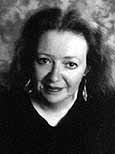
One of the jobs authors are required to perform to help promote their work is the strange task of procuring from other authors something called a “blurb”—the praise you’ll find on the back cover of books. They ought to come from authors whose readers might also be interested in your book--that's the idea. In 2006, when I sent out advance copies of my first novel “The Collaborator of Bethlehem,” I had no doubt I wanted one to go to Barbara Nadel, winner of the Crime Writers Association Silver Dagger the previous year. Her fabulous series of novels about Istanbul detective Cetin Ikmen delves into a society that we think we know a great deal about – only to demonstrate how much more complex is the reality. That’s one of the things I was trying to do with my Palestinian detective Omar Yussef. I’m pleased to report that Barbara recognized that, and she was kind enough to read and comment (favorably!) on my book. She’s published 11 terrific Turkish novels and is about to publish a new novel in her other series, in which the hero is a London undertaker. The two series are rather different and make varied demands on this intelligent writer, so I thought it’d be fascinating to ask her about The Writing Life.
How long did it take you to get published?
I first started trying to get published in 1992. At that time the notion of a mystery book, much less a series set in Turkey, was rejected as almost laughable. I’ll be honest, I gave up and put my first book Belshazzar’s Daughter in a drawer for 7 years. The only reason I ever took it out again was because in 1999 I was, yet again, totally broke and I thought, ‘why not give this old thing one more go? Maybe someone will give me some cash?’ So I sent it to an agent who, on this occasion, liked it. The next thing I knew I was involved in a three book contract! Now ten years on, I write two mystery series; the Inspector İkmen stories set in modern Turkey and the Francis Hancock mysteries set in 1940s London.
Would you recommend any books on writing?
I have to admit that I’ve never read any!
What’s a typical writing day?
I live in the north of England and so my first task of the day is to look out of the window and see what the sky is doing. That done, I try to get to my desk by about 8am and then work through until lunchtime. I don’t generally do lunch – a legacy of past chain-smoking – but just have a cup of tea and maybe, just occasionally, a cigarette. I’ll then work through until about 5 or 6pm. I don’t do this every day but try to work this schedule Monday to Friday if I can. I have pretty heavy family commitments and so it’s not always possible.
Plug your latest book. Why is it so great?
I have two books out next month, one paperback, an İkmen mystery called River of the Dead, and a new Hancock hardback called Sure and Certain Death.
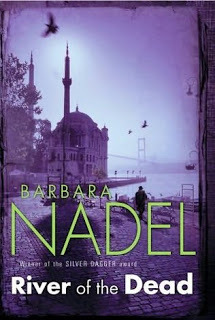
River of the Dead sees İkmen and his protégé Suleyman, in pursuit of an escaped prisoner. Yusuf Kaya is a murderer and drug dealer and when he escapes from prison in İstanbul it is suspected he has had help. Also because Kaya’s home town is in eastern Turkey it is strongly suspected he has gone back there. And so while İkmen pursues the investigation in İstanbul, Suleyman flies out to the eastern city of Mardin. There he finds not only drug dealing, gun running and the threat of terrorist attack, but also an exotic mix of people including Kurds, Suriani Christians and those who believe in an ancient snake goddess, the Sharmeran. This book came about as a result of a trip I made out to Mardin in 2007 and is I hope imbued with the same sense of magic and unreality that I found there. That said River of the Dead is also a tough book which address very real issues I talked to people about in Mardin, like the Iraq war. I think it’s great because although it is a crime story it is also a social commentary as well as, hopefully, introducing some people to the glories of south eastern Turkey.
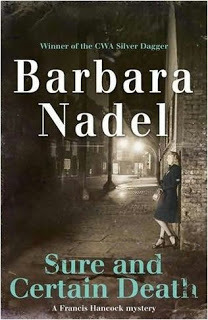
Sure and Certain Death is about a series of killings that take place in the London Borough of West Ham in 1941. Middle aged women are being attacked and eviscerated. Local people start whispering about Jack the Ripper being on the prowl again. One such victim is discovered in a bombed out house by undertaker Francis Hancock. A veteran of World War I, Francis suffers from shell-shock which means that sometimes he doesn’t always know that what he is experiencing is actually real. But soon the murders come close to home and he finds himself fearing for his own sister. Sure and Certain Death is a story about World War 2 that has its murderous roots in the darkest corners of Word War 1. I think it’s a good book because it is not either an obvious murder story or a straightforward story of the London Blitz. My father experienced the Blitz when he was a child and although the Hancock books do tell of the heroism of that time, they also aim to tell it like it was too. Francis Hancock’s world is therefore one of privation, dirt, anxiety and sometimes madness.
How much of what you do is dictated by genre formula, personal formula or complete originality?
My aim is always not to write to formula but to produce something fresh every time. However within the crime/mystery genre there are certain constraints, like having a ‘tidy’ ending. Not to do this is unsatisfying for the reader, even though I do sometimes want to reflect the sheer messiness of real life. In addition series characters do have back stories which have to be addressed in some form in every book and so formula could be said to apply there too. In the main however I don’t write to formula.
What’s your favourite sentence in all literature and why?
From Great Expectations by Charles Dickens. These are the first words Miss Havisham ever speaks to Pip. They sum up both the bitterness and the tragedy of her situation perfectly.
‘This,’ said she, pointing to the long table with her stick, ‘is where I shall be laid when I am dead. They shall come and look at me here.’
She knows that her relatives will only ‘come and look’ at her. They won’t grieve. They are only interested in her money. All this is conveyed so well in this cold little sentence.
How much research is involved in each of your books?
Quite a lot, although of course it does depend on the book. For River of the Dead I had to go to Mardin and its environs and talk to people so that was pretty full-on. With the Hancock series of course I have to do historical research into aspects of World War 2 every time. Enjoyable but time consuming.
Do you live entirely off your writing? How many books did you write before you could make a living at it?
For the first 6 years of my writing career I couldn’t make my living just from my books. I had a day job in a psychiatric hospital and wrote at night and at weekends. Since the Hancock series began however (4 years ago) I have (just) been able to survive on writing. However it’s not easy and I do have to supplement my income by writing short stories and bits of journalism.
How many books did you write before you were published?
I had one academic book published before ‘Belshazzar’s Daughter’ but no fiction. Not that I didn’t try. I wrote two books which I haven’t had published. Goodness knows if they’ll ever see the light of day!
What’s the strangest thing that ever happened to you on a book tour?
Meeting an old man who was called Mr İkmen and then, not twenty four hours later, seeing a Turkish policeman who looked just like my internal vision of İkmen’s protégé, Suleyman!
What’s your weirdest idea for a book you’ll never get to publish?
A horror story about a Victorian side-show man who kills people and then places them in sentimental tableau which he charges the public one penny to view. Ghastly and weird and clearly the product of a brain that is not what it should be. Mind you, Goths would like it I am sure!
Toronto Star: Palestinian crime novels the key to happiness
Toronto Star Mideast correspondent Oakland Ross writes about my path to happiness -- via the less than happy occurrences of the region. It's a different, more personal kind of profile than the sort of thing journalists usually write, which is perhaps due to the novelist's sensibility Oakland brings to the piece (He's the author of historical novels set in Mexico.)
Welsh writer quit Time magazine to pen books in popular sleuth series
May 27, 2009 Oakland Ross MIDDLE EAST BUREAU
JERUSALEM–Happiness did not find Matt Beynon Rees.
Instead, Matt Beynon Rees found happiness.
First, however, he was obliged to travel to the Middle East, not a region of the world noted for an over-abundance of glee. Read more...
Welsh writer quit Time magazine to pen books in popular sleuth series
May 27, 2009 Oakland Ross MIDDLE EAST BUREAU
JERUSALEM–Happiness did not find Matt Beynon Rees.
Instead, Matt Beynon Rees found happiness.
First, however, he was obliged to travel to the Middle East, not a region of the world noted for an over-abundance of glee. Read more...
Magically Inventive: Darren Craske's Writing Life interview
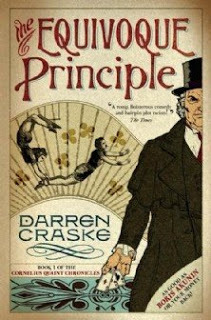
The Victorian-era crime novel has been a firmly established sub-genre from Sherlock Holmes to Anne Perry’s William Monk. But it has never seen anything like Cornelius Quaint. The hero of Darren Craske’s devilishly cunning new series (the first book, The Equivoque Principle, is just out in paperback) is a conjurer whose sleight of hand is matched only by the author’s ability to twist his plot like some contortionist colleague of Quaint's in Dr Marvello’s Travelling Circus. Craske is something of a man of mystery himself, having declined to provide a photo of himself for this interview. But even if you can’t see his no doubt handsome features, you’ll find he reveals enough of himself to make it clear exactly where the inventiveness of his novel comes from. He also outlines a route to publication that's different from the one most aspiring authors would expect to take.
How long did it take you to get published?
I would say that it took me somewhere in the region of 3 years to actually get a publishing deal, although THE EQUIVOQUE PRINCIPLE was sent to only one publisher, and the deal was struck pretty much instantly. I submitted several chapters of THE EQUIVOQUE PRINCIPLE to THE FRONTLIST website (www.thefrontlist.com) which is a great place for aspiring writers to display their work, and receive criticisms and guidance from peers who are all trying to snare that elusive publishing deal. The idea is simple: you place your work online, and in return must critique several other authors’ work and grade it on a points system. Those works receiving the highest marks automatically get sent on to Scott Pack at THE FRIDAY PROJECT, a vibrant company now under the wing of HarperCollins, that specialize in making fab books out of online material. THE EQUIVOQUE PRINCIPLE was read, and I received a request to send the completed manuscript along. I guess Scott saw promise in this young writer’s work, and soon a deal was offered for three books in the Cornelius Quaint Chronicles series and that was that. A far cry from my budding writer days.
I have gone through the whole slush pile reject thing, and I know exactly how most young authors feel. I can vividly recall wading through THE WRITERS AND ARTISTS YEARBOOK at my local library, compiling a list of contacts, then sending off my work, waiting patiently as the weeks ticked by, watching the postman approach my house, and wondering whether this was ‘the one’. The other books that I worked on prior to signing were just not good enough, or I was just not a good enough writer back then. I have revisited much of the old work since. I have tarted them up a bit and reshaped whole sequences, sometimes the entire plot. I do not believe that any ideas are wasted ones, and I have dipped into this little pool of potential ideas many times over the years, and even included some action sequences from way back in 2003 in some of the forthcoming Cornelius Quaint novels. I have a folder on my hard drive with a ton of ideas. Some just the bare bones, some fully fleshed out and completed, and some nothing more than a blank page with a title.
Would you recommend any books on writing?
I found that a lot of the so-called ‘self help’ books can be distracting, and too often a great idea can be watered down and even killed off by worrying too much about the whys and wherefores. I would say first and foremost is to get yourself a damn good plot – or some damn good characters and create a damn good plot along the way. I would recommend to any newbie writer that you join an authors’ forum and get some guidance from people who are in the same boat as you. There are a load of them about -- You Write On, The Frontlist, Writers News talkback etc. You’ll learn far more from writing from an unbiased peer than anything you’ll read in a How To book.
What’s a typical writing day?
Well, in my writing no day is typical. A lot of my ideas are created just before I go to sleep. Dialogue, action, plot points, alterations etc are all fleshed out whilst my head is on a pillow and then committed to my laptop the next moment I can get. I have a trusty notebook by my bedside, and regularly scare the crap out of my wife by snapping on the lamp and scribbling like a madman for five minutes, only to flop back down and start again. Needless to say, she is fairly understanding!
Once I know where I am going with a book, I let a lot of it write itself. Things just happen in due course. I am presently working on the 4th Cornelius Quaint novel called THE ROMULUS EQUATION, and from what has been set up in the previous novels, there is a definite place that I need to get to, and so I write and craft and edit and shape until I get there. It’s kind of like going on a long car journey. I know where I’m going, even though I have no sat-nav to get me there, and I only have a vague idea what it will be like when I get there. But there are defined refueling points along the way that I need to reach if the ending is going to make any sense. When I know I am almost there, writing the last quarter of a book is an amazing rush.
Plug your latest book. What’s it about? Why’s it so great?
My latest novel is also my first; the first in a series that I hope will be around for some time. THE EQUIVOQUE PRINCIPLE is many things, and I am so proud of what I have created, and I know it will surprise a lot of people. It has been compared the THE VESUVIUS CLUB and THE GLASS BOOKS OF THE DREAM EATERS, but to lump EQUIVOQUE in with those fantastic novels would be doing it only half a service. At its heart, THE EQUIVOQUE PRINCIPLE is a Victorian detective adventure, a brand new world based on familiar foundations – yet along the way the story evolves to such a degree that NO ONE will be able to predict where it is going next. Let me just say that the word equivoque to the uninitiated means a double meaning, or a misdirection – and it is no coincidence that the main character is a master of slight of hand conjuring. THE EQUIVOQUE PRINCIPLE is unique, and once we get to the end, the possibilities of where the sequels take us are as unpredictable as Cornelius Quaint himself!
How much of what you do is:
a) formula dictated by the genre within which you write?
Not so much formula as the timestamp of history. As my books are set in the Victorian age, many times have I written something amazing only to have it stomped on by history. Writing historical based novels makes your palette a little more restricted, yet it also frees you up to do great things. Compare the older James Bond films and movies like the Indiana Jones trilogy where everything was staged for real. The explosions, the locations, the stunts, the bangs and the blasts – they were done live. In this day of CGI it has flattened and removed a few layers of the art of believability, so when I write some of my action sequences, this is what I have in mind – ground yourself in reality as much as you can and then play like hell with it.
b) formula you developed yourself and stuck with?
Although my Cornelius Quaint books can be pigeonholed in amongst the Victorian detective genre, I think by the time the reader gets to the end they will pretty much forget that notion as anything can happen moving forwards.
c) as close to complete originality as it’s possible to get each time?
My stories, the plots, the characters and dialogue are as original as it gets in that they sprang from my creative mind, but I think it’s a mistake to forget every piece of literature ever written, every film seen, every piece of music heard. There are no original ideas, only old ideas done completely differently.
What’s your favorite sentence in all literature, and why?
That’s a good question, but I think for me my favourite sentence is this one:
"The ships hung in the sky in much the same way that bricks don't." by Douglas Adams from The Hitchhhiker’s Guide to the Galaxy.
What’s the best descriptive image in all literature?
Hmm. I can’t say what exactly, but I can tell you who writes it – David Mitchell. Cloud Atlas contains some of the most superlative examples of literary delight that I have ever read, in much the same way as you slap yourself on the forehead and wish to god that you’d written that line yourself.
Who’s the greatest stylist currently writing?
I love a whole host of people who are masters in their field, but not necessarily for the reasons you might think. Eoin Colfer, Phillip Pullman, Neil Gaiman, JK (the goddess) Rowling, Michael Moorcock, Gideon Defoe, Paul Stewart and Chris Riddell to name but a few.
Who’s the greatest plotter currently writing?
Unashamedly I would have to say JK Rowling, for the effortless interconnections of some superb subtleties of plotline. If I ever met her, I really want to know if it was all as intentional as it seemed…JK, if you’re reading this, drop me a line. Inquiring minds want to know.
How much research is involved in each of your books?
Too much, but that’s the price I pay for setting my books in the 1850’s. It’s not really my fault. In Who Framed Roger Rabbit, Jessica Rabbit says: ‘I’m not bad…I’m just drawn that way’ which is probably my second favourite line. The fact that she’s an animated rabbit only adds another layer to it – but the idea for THE EQUIVOQUE PRINCIPLE along with all the characters in Dr Marvello’s Travelling Circus announced themselves to me one night in a bewildering display of subconscious thought. I did not choose to write about Cornelius Quaint’s adventures…he chose me.
Where’d you get the idea for your main character?
Cornelius Quaint arrived in my head one night and forcefully introduced himself. I was immediately enthralled. Madame Destine arrived soon after, and she was as much a mystery to me as she is to Quaint. So, Cornelius and I set about trying to learn as much about her as we could.
Do you have a pain from childhood that compels you to write? If not, what does?
A pain from childhood. Hmm, now where could I go with that one? I always had the writing bug, even from a tender age, but I am also an artist (I part illustrated the cover to EQUIVOQUE) and so immersed myself more in comic strip art than the story. My skills as a writer were always there, but I relied on my art to tell the story. I suppose that I was an okay-level footballer with a championship manager inside of me waiting to get out.
What’s the best idea for marketing a book you can do yourself?
The best idea would be to write a book totally in red and green ink, and then send some satellites up into space and use gigantic manufactured 3D lenses to cover the sun – which would render all printed word illegible, except for my own novel. Ergo, I would rule the world with the written word.
What’s your experience with being translated?
It has yet to happen, but as the royalties increase – I’m all for it!
Do you live entirely off your writing?
No, I have a ‘real’ job to supplement my mortgage, wife and kids. The books are a vocation that became a hobby that if I am really, really lucky will enable me to focus on them one hundred percent. Most writers have to struggle to make ends meet, and as much as I’d like to proclaim that I am part of some avant-garde, that don’t pay the bills.
How many books did you write before you were published?
3. Two of them were pretty rubbish, but one is great and it will see print if it kills me.
What’s the strangest thing that happened to you on a book tour?
Not yet done a book tour, but I hope that something strange will occur – as long as it’s nothing to do with being late. Unless it’s worth it. Like being abducted by aliens, or something. That opportunity only comes around once, or twice if you live in the deep south of America.
What’s your weirdest idea for a book you’ll never get to publish?
I’d rather not say, because one day I do hope to publish it – it’s dead good, and it is about a basket of dirty washing waiting to go into the washing machine. It’s very Pixar, and kids all over the world would be wearing the main characters (socks and a pair of underpants) quite literally as socks and a pair of underpants. Anyone thinking of plagiarizing that idea, two words of warning: I SUE.
Next in The Writing Life: Watch out, God! Here comes Shalom Auslander.
Outrage: Raymond Chandler in the trash
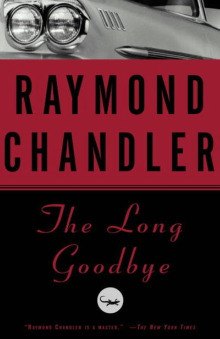 The last decade has been one of outrage piled upon outrage, from 9/11 to the wars in Afghanistan and Iraq, on to Hurricane Katrina, the Asian tsunami and the smart-ass bankers who thought they ruled the world they were in the process of destroying. On the first day of the new decade I was faced with something less outrageous, perhaps, but somehow even more puzzling than any of these things.
The last decade has been one of outrage piled upon outrage, from 9/11 to the wars in Afghanistan and Iraq, on to Hurricane Katrina, the Asian tsunami and the smart-ass bankers who thought they ruled the world they were in the process of destroying. On the first day of the new decade I was faced with something less outrageous, perhaps, but somehow even more puzzling than any of these things.I was walking along a street near my home in Jerusalem with a friend. A few paperbacks had been dropped on the ground by a dumpster. I glanced down. "That can't be," I thought. Then, aloud, I said: "You're kidding me."
Someone had thrown out "The Long Goodbye." Someone had put Raymond Chandler in the trash, with a few highly disposable beach-reading tomes. I picked it up gently.
For me this is the greatest American novel of the last century, yet it was sitting alongside the kinds of holiday reading people tend to ditch as soon as they've skimmed to the "exciting" conclusion.
Chandler would've raised one of his wry eyebrows, or perhaps one of the gimlets that appears as a motif in "The Long Goodbye." He knew what people thought of his work--those who hadn't read it at least. Not real literature, genre stuff. People say the same thing to me sometimes, until they read my books. Chandler once wrote that as many bad "literary" novels are written as there are bad crime novels, but the bad literary novels don't get published. (One might note that this no longer seems true, but you get his point: people thought his books were trash, like the genuine trash that was sold alongside it.)
Why's his novel so good? Many reasons, not least of which is Chandler's astonishing way with an image. Try this one: a beautiful woman has just walked into a bar where sleuth Marlowe awaits a client. "It seemed to me for an instant that there was no sound in the bar," Chandler writes, "that the sharpies stopped sharping and the drunk on the stool stopped burbling away, and it was like just after the conductor taps on his music stand and raises his arms and holds them poised."
You don't even have to be a male who once sat lonely in a dingy dive for that sentence to stop everything--the narrative, your breath, your heart. Turns out the woman will be an important character. We don't know it yet for sure, but somehow it's been signaled by the punctuation point of this image.
The friend I was walking with declined at first to take "The Long Goodbye," when I proferred the grubby edition. "I don't really read crime novels," he said.
I shoved it into his midriff. "Read it," I said. "It's a masterpiece."
Then I looked at the other books on the floor. Sometimes around where I live people dispose of the library of a deceased person by placing it on the street for others to pick up. I shook my head. Even when I die, I don't want my copy of "The Long Goodbye" left in the dust and wind of a desert winter.
I want to be buried with it.
Literary reviews: If you can’t say something nice…
That’s not because of any insecurity about my writing. If a review is bad, I know the reviewer got it wrong. It’s the mere existence of negative thoughts about me and my work floating around out there, even if it’s only an aside in an otherwise positive review – that’s what makes my lunchtime hummus taste like cement.
It’s a feeling highlighted by the gratitude of a good review and the sheer love felt for the writer of a really glowing review. Right now, for example, I’m quite in love with Joe Hartlaub, reviewer for Bookreporter.com. A couple of days ago, Joe published a review of THE FOURTH ASSASSIN, my latest Palestinian crime novel. He wrote:
“Matt Beynon Rees, a Welsh journalist living in Jerusalem, writes a series known as the Omar Yussef Mysteries. If you pick up anything at all that is bound between two covers, you should be buying and reading them even if you hate mysteries. If you happen to like mysteries, please read THE FOURTH ASSASSIN, the latest Yussef novel, and recommend it to an unenlightened friend.”
You’re very kind, good sir. But wait, Joe goes on:
“Take a look at the first four pages or so. The book begins with Yussef, newly arrived in the United States, climbing the stairs of the Fourth Avenue subway exit in Brooklyn in the heart of Little Palestine. Much is familiar, and much is different. I may have read better written passages recently, but I don’t think I have read any that I have loved as much as the ones contained in these opening pages. This is classic work that will stand up 20 or 30 years from now when you (maybe) and I (almost certainly) are gone, and the problems that currently exist will still remain. Brilliantly conceived and beautifully written, THE FOURTH ASSASSIN is strongly recommended.”
Thirty years? Joe, may you live to 120.
My delight in this review isn’t the same as kick my two-year-old gets when I tell him he’s the most handsome boy in the world. No, it’s rather that someone has chosen to do exactly what I try so hard to do day by day – to be positive.
And being positive about a book seems strangely hard for people to do.
Many reviews, positive ones in particular, measure out the encouraging phrases as if they were sugar to a diabetic.
Truly negative reviews, of which I’ve only really had one, seem entirely a reflection of an almost psychopathic need to be both right and a little cruel at the same time. (That’s why Alain de Botton famously fumed when he received such a review for his book a year ago. Someone was being a smartass at his expense, and in a forum where he felt he had no comeback. Like being sassed by a cool kid at school when you’re unable to talk back.) There’s also a degree of showing off in a negative review which always makes them deeply suspect, in my opinion – was this a bad book, or simply something about which our reviewer needs to show himself to be the most knowledgeable fellow in the world?
Few writers these days claim to never read reviews. But it’s a dangerous pastime, particularly with the plethora of blogs and even reader reviews on amazon.com. Reviews on amazon are mostly conscientious, but every book seems to have at least one review on that site which begins “I couldn’t get past the first chapter, don’t know why, maybe it was just me, but I gave the whole book only one star anyway.”
A couple of years ago I decided never to write a negative review. I was sure that in a karmic way it’d come back to haunt me. I expressed this view to a literary editor who had sent me a true stinker for review. He twisted my arm; I wrote the review; something mildly unpleasant happened soon after. I know why. It won’t happen again.
Published on March 07, 2010 07:16
•
Tags:
alain-de-botton, amazon-com, blogs, bookreporter-com, brooklyn, crime-fiction, jerusalem, joe-hartlaub, kingsley-amis, literary-reviews, little-palestine, matt-beynon-rees, mysteries, mystery-fiction, omar-yussef, reviews, the-fourth-assassin, united-states, wales
Best First Paragraphs in Crime Fiction: Part 1
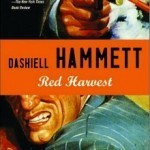 If you have a lot of time to waste, you never judge a book by its cover. But don’t try telling me you don’t judge it by its first paragraph.
If you have a lot of time to waste, you never judge a book by its cover. But don’t try telling me you don’t judge it by its first paragraph.What makes a great first paragraph? And which are the greatest? We all have favorites, some of which have become clichéd –– as happens to anything, whether it’s the best of times or the worst of times, or if you grew up in a family that was unhappy in its own way. See what I mean?
In general it’s hard to beat Hemingway’s opening to “The Sun Also Rises” for laying out the narrator’s character, as well as the character being described: “Robert Cohn was once middleweight boxing champion of Princeton. Do not think that I am very much impressed with that as a boxing title, but it meant a lot to Cohn.”
But what about crime fiction? Over the next few weeks, I’m going to look at some of the best first lines and paragraphs in the genre. Next week, we’ll do a little Chandler (how did you guess?) and then we’ll be on to Simenon, who was a nasty enough man to write perfectly bitter downbeat prose from the very start of his books.
Let’s begin, though, with the man who in many ways beats them all: Dashiell Hammett.
I bet you think I’m going to talk about “The Maltese Falcon,” which in the first paragraph describes Sam Spade as looking “rather pleasantly like a blond Satan.”
But I’m not.
No, we’re going to have a quick gander at the opening of “Red Harvest,” Hammett’s first novel, in which his Continental Op heads to a corrupt small town. It starts this way:
I first heard Personville called Poisonville by a red-haired mucker named Hickey Dewey in the Big Ship in Butte. He also called his shirt a shoit. I didn’t think anything of what he had done to the city’s name. Later I heard men who could manage their r’s give it the same pronunciation. I still didn’t see anything in it but the meaningless sort of humor that used to make richardsnary the thieves’ word for dictionary. A few years later I went to Personville and learned better.
For the rest of this post, read The Man of Twists and Turns.
Published on December 15, 2011 03:36
•
Tags:
crime-fiction, dashiell-hammett, detective-fiction, first-paragraphs, mysteries, noir-fiction, style, writers, writing
Best First Paragraphs in Crime Fiction: Part 2
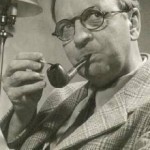 I’m writing this in a plain office in the corner of a building that was described by the realtor as “exclusive,” though it doesn’t exclude despondent ultra-Orthodox Jews panhandling for cash, plumbers who break all the pipes you hadn’t called them to fix, or the cheerful lady who lets her dog pee in the elevator. There’s the hum of heavy traffic from the road below and a view across the valley of brake lights on a highway where no one ever seems to move. The air is clear enough up here that I usually only smell me, sweating through the desert heat, except when the garbage truck empties the trashcans and sends up a rotten fruit ripeness, or when the khamsin blows and I can smell the dirt on the hot wind. There’s a mosquito in here, but the bastard isn’t friendly enough to show himself. When he does, I’ll do what people in the Middle East do best. There are already spots of my blood across the whitewash where his brothers and sisters felt the thick side of my fist.
I’m writing this in a plain office in the corner of a building that was described by the realtor as “exclusive,” though it doesn’t exclude despondent ultra-Orthodox Jews panhandling for cash, plumbers who break all the pipes you hadn’t called them to fix, or the cheerful lady who lets her dog pee in the elevator. There’s the hum of heavy traffic from the road below and a view across the valley of brake lights on a highway where no one ever seems to move. The air is clear enough up here that I usually only smell me, sweating through the desert heat, except when the garbage truck empties the trashcans and sends up a rotten fruit ripeness, or when the khamsin blows and I can smell the dirt on the hot wind. There’s a mosquito in here, but the bastard isn’t friendly enough to show himself. When he does, I’ll do what people in the Middle East do best. There are already spots of my blood across the whitewash where his brothers and sisters felt the thick side of my fist.If that sounds like a spoof, you surely know who I’m caricaturing. We decided last week that you couldn’t do much better than the opening paragraph of Hammett’s “Red Harvest” for an introduction to the narrative voice, narrator, place and tone of the entire novel. But if anyone could beat it, we’d have to look at Raymond Chandler.
The grumpy god of the gumshoe genre claimed not to have much time for the
idea of a classic in crime writing. In one of his essays, he wrote that contemporary writers who aimed for historical fiction, social vignette, or broad canvas would never surpass “Henry Esmond”, “Madame Bovary”, or “War and Peace”. Crime writers, on the other hand, would easily be able to
devise a better mystery than the ones detailed in “The Hound of the
Baskervilles” or “The Purloined Letter”. “It would be rather more difficult
not to,” he wrote.
Still, the poet with the pipe (okay, no more quirky names for Ray) proved
himself wrong. Or rather he proved that he was right not to focus so much
on the mystery element and, instead, to build a mysterious atmosphere and a sardonic sense of humor. From the opening paragraph.
This is how he starts a long 1950 short story called “Red Wind”:
There was a desert wind blowing that night. It was one of those hot dry
Santa Anas that come down through the mountain passes and curl your hair
and make your nerves jump and your skin itch. On nights like that every
booze party ends in a fight. Meek little wives feel the edge of the carving
knife and study their husbands’ necks. Anything can happen. You can even
get a full glass of beer at a cocktail lounge.
Like the opening paragraph of “Red Harvest,” this gives us all the elements
we’d expect. It also tells you a lot about the narrator and his lifestyle.
The booze parties, and the sense of being gypped at the cocktail lounge.
But the opening paragraph which might be said to define an entire genre ––
and the sub-genres of attempts to copy the true representatives of the
genre, and also to parody it –– starts Chandler’s 1949 novel “The Little
Sister”:
Read the rest of this post on my blog The Man of Twists and Turns.
Published on December 21, 2011 23:12
•
Tags:
crime-fiction, dashiell-hammett, mysteries, noir-fiction, philip-marlowe, raymond-chandler
Poisonville: Song of the crooked hoboes
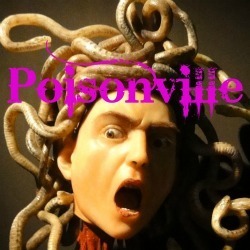 My Poisonville project produces music about crime fiction. Some of the songs are about my books, some about the work of greats like Chandler, and others are collaborations with contemporary writers. This is the title song of the project, the album, the band. It's based around Dashiell Hammett's first novel "Red Harvest." At the start of the book, Hammett's narrator, a detective called the Continental Op, says that he "first heard Personville called Poisonville by a red-haired mucker named Hickey Dewey." Later, he says, he heard the name pronounced that way by people who didn't also called their shirt a "shoit." The novel shows us why Personville deserved the name. The song was co-written by The Talented David Brinn who plays the accordion. I do the rest. I aimed for a sound like a bunch of crooked hoboes playing in a Poisonville speakeasy.
My Poisonville project produces music about crime fiction. Some of the songs are about my books, some about the work of greats like Chandler, and others are collaborations with contemporary writers. This is the title song of the project, the album, the band. It's based around Dashiell Hammett's first novel "Red Harvest." At the start of the book, Hammett's narrator, a detective called the Continental Op, says that he "first heard Personville called Poisonville by a red-haired mucker named Hickey Dewey." Later, he says, he heard the name pronounced that way by people who didn't also called their shirt a "shoit." The novel shows us why Personville deserved the name. The song was co-written by The Talented David Brinn who plays the accordion. I do the rest. I aimed for a sound like a bunch of crooked hoboes playing in a Poisonville speakeasy.[soundcloud url="http://api.soundcloud.com/tracks/4069..." params="auto_play=false&show_artwork=true&color=ff7f00" width="100%" height="166" iframe="true" /]
Published on May 09, 2012 03:00
•
Tags:
crime-fiction, dashiell-hammett, music, mysteries, noir-fiction
Krimis, gialli, polars: What crime novels are called around the world
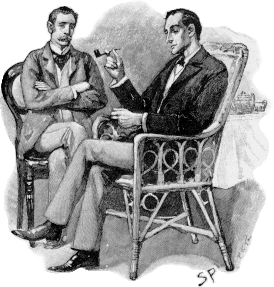 People talk about crime novels as though they were all the same. The sheer variety of names for sub-genres of the crime novel proves that isn’t true. Police procedural. Mystery novel. Thriller. Cosy. Exotic detective. Supernatural.
People talk about crime novels as though they were all the same. The sheer variety of names for sub-genres of the crime novel proves that isn’t true. Police procedural. Mystery novel. Thriller. Cosy. Exotic detective. Supernatural.I used to think there was little real difference, but then my UK publisher told me he wanted to change the title of my first novel “The Collaborator of Bethlehem.” He thought it sounded like a thriller (which men typically buy) and he wanted it to be clear that it was a mystery (so that women would pick it up.) He changed the title in Britain to “The Bethlehem Murders.” It sounds more like a mystery, although it always seems a little cosier to my ear than it ought. My original title sounds much closer to the gritty atmosphere of Bethlehem in the intifada that I recreated in that novel. I suppose he was right, because the book was nominated for five prizes in the US, but in the UK it actually won one: a Crime Writers Association Dagger.
In any case that’s only how the book was titled in English. My Spanish publisher called it "The Teacher of Bethlehem," as did my Italian editor. In German it's "The Traitor of Bethlehem." Etcetera.
When my second novel "A Grave in Gaza" came out, my London publisher was at it again. "Gaza makes me think of nonfiction," he said. So in the UK the book was called "The Saladin Murders," which sounds like a mystery, after all. (I used the name of the Saladin Road that runs the entire length of the Gaza Strip and which plays a big role in the action of the novel.)
As I travel around to promote my books in different countries (I’m published in 25 languages these days), I’ve noticed that it isn't only the titles of individual books that get different names. The entire genre of crime fiction gets some interesting and handy nicknames depending on where you are. Some of them are quite entertaining and often tell us how the genre developed in that country.
Take Italy. Mystery novels there are called “gialli,” or yellows. That’s because traditionally the genre was published with a yellow cover. Even today the mystery shelves of Italian bookshops are largely yellow, at least down the spine. Color is the theme also in Spain, where crime novels are “novelas negras,” black novels. According to a source of mine on the literary desk of El Pais, the big Spanish newspaper, this harks back to the old “Serie noire” of French publisher Gallimard. That series introduced the crime novel to Spain. So noir, or black, became the identifying color for a crime novel.
A “roman noir,” black novel, is also one of the ways of referring to a crime novel in France, because of that Gallimard series. But the most common slang for a mystery in French is “un polar.” It’s a contraction of “roman policier,” police novel, and was first recorded in 1968. If you ask most French people to explain the origin of the word “polar,” they can’t tell you: the abbreviation has become so common, they’ve forgotten its rather simple derivation.
Germany (as well as the Scandinavian countries) calls a crime novel “ein Krimi,” short for the word Kriminelle, criminal. No surprise there. It’s a catch-all for thrillers and detective stories of all kinds.
There is, however, an amusing sub-genre in German. In English, the “cosy” refers to Miss Marple-type novels in which the detective is an amateur, usually a lady (not just a woman), probably an inhabitant of a quaint village, investigating a murder in a country house or a vicarage. The Germans call these cosies “Häkel-Krimis“ -- “Crochet Crime-Novels.” Because the detective puts away her crocheting to solve the murder.
I’ll keep scouting for interesting ways of describing crime novels around the world. But if you know of some others, tell me about them.



